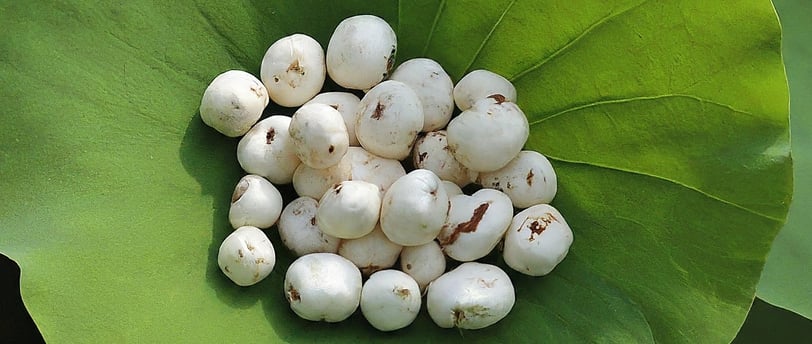The Intricacies of Makhana Production and Market Dynamics in India
7/5/20244 min read


The Origins and Nutritional Value of Makhana
Makhana, commonly known as fox nuts, is an aquatic crop that has been cultivated for centuries in India. Revered for its nutritional benefits, makhana is a rich source of protein, fiber, and essential minerals such as magnesium, potassium, and phosphorus. Despite its health benefits and growing popularity, the production and extraction process of makhana remains labor-intensive and geographically limited.
Cultivation of Makhana
1. Farming and Harvesting Makhana is primarily cultivated in the eastern regions of India, particularly in Bihar, which accounts for about 90% of the total production. The process begins with the sowing of makhana seeds in waterlogged fields, typically in the summer months. These fields, often referred to as ponds or wetlands, provide the perfect environment for the growth of the makhana plant.
The plants grow underwater, and their large leaves float on the surface. After about five to six months, the seeds are ready for harvesting. Harvesting is a labor-intensive process that involves skilled farmers diving into the water to collect the seeds from the bottom. This traditional method has been passed down through generations and requires immense skill and effort.
2. Seed Breaking and Pre-Processing Once harvested, the seeds, known as 'gorgon nuts', undergo a meticulous pre-processing phase. The initial step is to dry the seeds in the sun for several days until they harden. These dried seeds are then roasted in a pan at high temperatures, which causes them to pop, similar to popcorn. The popped seeds are then manually cracked open to extract the white, puffy makhana kernels.
The Supply Chain and Market Challenges
1. The Role of Traders The journey of makhana from the farmer to the retailer involves multiple players. After the initial processing, the makhana is sold to local traders. These traders play a crucial role in aggregating the produce from various farmers and ensuring that the makhana reaches larger markets.
Traders often face challenges such as fluctuating market prices, the perishability of makhana, and the need to maintain quality during storage and transportation. Despite these challenges, they ensure a steady supply of makhana to the processing units.
2. Processing Units At the processing units, makhana undergoes further refinement. The seeds are cleaned, sorted, and graded based on size and quality. Grading is essential as it determines the final market value of the product. The best quality seeds, often referred to as grade 7, are reserved for premium products.
The seeds are then roasted again to enhance their flavor and texture. This step requires precision to ensure that the seeds do not burn and retain their nutritional value. After roasting, the seeds are packaged in airtight containers to maintain freshness and prevent contamination.
Market Dynamics and Competitiveness
Given that Bihar is the predominant producer of makhana, the market dynamics are heavily influenced by factors such as regional agricultural practices, climate conditions, and local economic policies. The competitiveness of makhana in the market is affected by the limited geographical production, which can lead to supply constraints. Additionally, the high production costs and labor-intensive processes add to the pricing challenges.
Despite these hurdles, the demand for makhana has been steadily increasing, both domestically and internationally, due to its health benefits and versatility as a snack and culinary ingredient. Entrepreneurs and cooperatives in Bihar are exploring innovative methods to enhance production efficiency and reduce costs. This includes mechanization of certain processes and the establishment of cooperative societies to support small-scale farmers.
Future Prospects and Opportunities
As the demand for healthy and nutritious snacks grows, the future prospects for makhana appear promising. There is potential for expanding the cultivation area beyond Bihar, provided that similar water bodies and climatic conditions are available. Additionally, research into more efficient harvesting and processing techniques can help lower production costs and make makhana more competitive in the global market.
Furthermore, government support and investment in infrastructure can play a crucial role in boosting the production and market presence of makhana. Initiatives aimed at providing financial and technical assistance to farmers can help overcome the current challenges and ensure a sustainable and profitable makhana industry in India.
The Journey to Retail Markets
Getting makhana to the retail market is another complex process. Distributors purchase makhana from processing units and supply it to various retail outlets. This step involves extensive logistics and coordination to ensure that the product reaches consumers in optimal condition.
Retailers, both online and offline, play a crucial role in making makhana accessible to consumers. They ensure that the product is displayed attractively and provide consumers with information about its health benefits and uses.
Why Choose Lotus Makhana?
At Lotus Makhana, we understand the challenges and intricacies involved in the sourcing and processing of makhana. Here’s why you should choose us:
Premium Quality: We source only the finest grade makhana, ensuring that you get the best product every time.
Sustainable Practices: We are committed to sustainable farming and processing practices that benefit both the environment and the farmers.
Health Benefits: Our makhana is rich in nutrients and free from artificial additives, making it a healthy and natural snack option.
Ethical Sourcing: We work directly with farmers and ensure fair trade practices, supporting their livelihoods and promoting ethical sourcing.
Choosing Lotus Makhana means choosing quality, sustainability, and a product that has been crafted with care from farm to table. Enjoy the goodness of makhana with us and make a healthy choice for you and your family.
Connect with us
Subscribe to our newsletter
enquiries@lotusmakhana.com
Copyright © 2024 Lotus Makhana. All Rights Reserved
